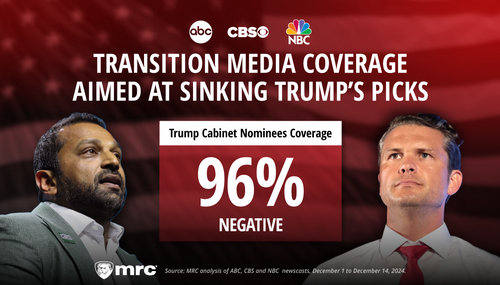NPR and PBS have finally touched the Gruber brouhaha, but neither showed any enthusiasm for it. On Sunday morning’s Weekend Edition, anchor Rachel Martin and reporter Mara Liasson dismissed it in 59 seconds.
On the PBS NewsHour Monday, anchor Judy Woodruff brought in two liberal journalists to discuss Gruber, but first Woodruff asked six questions about how open enrollment was going.
The NPR.org headline was "After G-20 Summit In Brisbane, Obama Focuses On Domestic Issues." Without any reference to how hard they had worked to ignore it, NPR’s Rachel Martin brought it up like a strange piece of arcana. Liasson finished with Obama’s denials that this Gruber thing meant anything:
RACHEL MARTIN: So speaking of those domestic controversies, he was asked about something to do with Obamacare - specifically about an MIT economist and consultant, someone named Jonathan Gruber? Who is this guy?
MARA LIASSON: Yes. Jonathan Gruber was pretty obscure until recently. But he is a health care economist. He helped develop the computer models that were the underpinning for Romneycare in Massachusetts and Obamacare. And tape surfaced of him saying at a 2013 conference. He said, well, we couldn't tell the American people how the health care mandate worked, and that it was really a tax. We relied on, quote, the stupidity of the American voter.
Well, Republicans pounced. They said this shows that Obamacare was passed with a lack of transparency. It was built on a series of lies. And the president was asked about it at his press conference in Australia. And he said that's ridiculous. I don't agree with that at all. It's not true. And every single aspect of Obamacare was debated in Congress and in the Supreme Court.
On PBS, Judy Woodruff turned to former NPR health reporter Julie Rovner, now with Kaiser Health News, which bills itself as an “editorially independent program of the Kaiser Family Foundation,” but the foundation has long favored nationalized health care. The other journalist was Louise Radnofsky of The Wall Street Journal, whose Twitter account is brimming with Obamacare-enrollment news, but not a word about Gruber (and passing along Team Obama statements, but no Republican statements).
Rovner suggested “There’s not the impression that he was in the room when all of the key decisions were made, but he certainly was involved.” Radnofsky also tried to downplay the connection, that Gruber was “one of many, many central figures,” a weird phrase:
JUDY WOODRUFF: That’s the question, because, Louise, some have called him an architect of the health care law. How central was he to all this?
LOUISE RADNOFSKY: He’s certainly one of many, many central figures, which is not a very helpful explanation to people at this stage. But if you think about it, there were officials in each agency working on this from HHS to the White House. There were officials in many different congressional offices, and then there were outside experts as well, including some in academia. So there’s no shortage of people out there who were involved.
Later, both channeled the notion that this Gruber obsession is just a “conservative pundit” thing for people trying to damage Obamacare:
RADNOFSKY: Well, one of the key issues in what he’s saying is that it plays into fears of conservative pundits of the law like Senator Lankford that this was in some way a con or in some way passed without transparency or rammed down the throats of people without their involvement in it. And so that’s one part of it....
ROVNER: But I think the problem is that there was already sort of this pile of dry kindling among the Republicans trying to figure out what to try to do about this law that they don’t like and they perceive the public doesn’t like. And this basically lit a match and threw into that pile of dry kindling.
JUDY WOODRUFF: Louise Radnofsky, how many damage do you — additional damage? There’s already — we already see public opinion continuing to drop in support of the health care law. How much does this hurt what the administration is trying to do, do you think?
LOUISE RADNOFSKY: Well, the timing is very, very particular to the open enrollment cycle.
It had been building up all week, but really seemed to explode into more mainstream attention around the time that the exchanges opened, and that may or may not be an accident.
It’s certainly no accident than NPR and PBS resisted offering any “mainstream attention” to Gruber for days and days.




